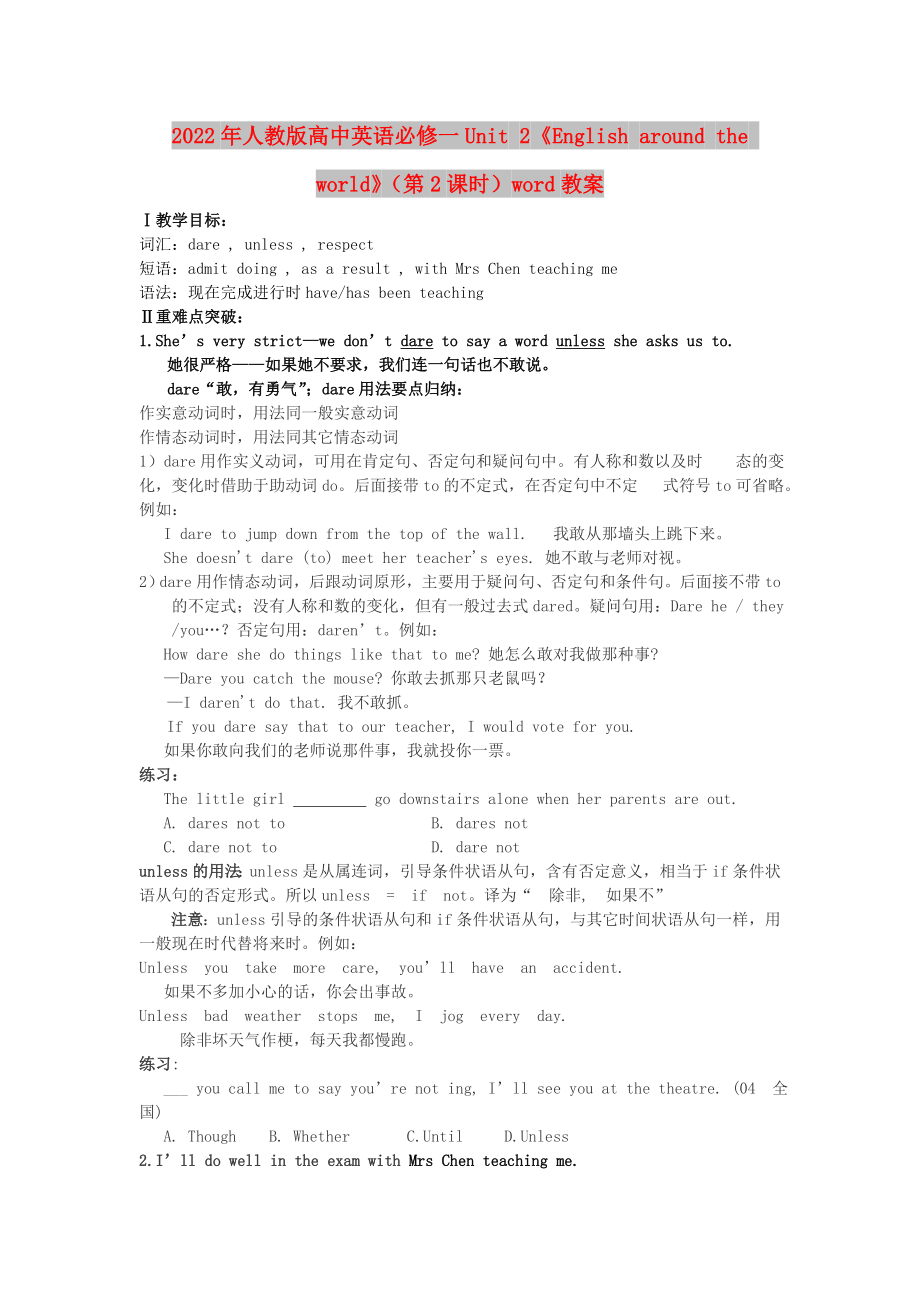《2022年人教版高中英語必修一Unit 2《English around the world》(第2課時(shí))word教案》由會(huì)員分享�,可在線閱讀,更多相關(guān)《2022年人教版高中英語必修一Unit 2《English around the world》(第2課時(shí))word教案(2頁珍藏版)》請(qǐng)?jiān)谘b配圖網(wǎng)上搜索�����。
1��、2022年人教版高中英語必修一Unit 2《English around the world》(第2課時(shí))word教案
Ⅰ教學(xué)目標(biāo):
詞匯:dare , unless , respect
短語:admit doing , as a result , with Mrs Chen teaching me
語法:現(xiàn)在完成進(jìn)行時(shí)have/has been teaching
Ⅱ重難點(diǎn)突破:
1.She’s very strict—we don’t dare to say a word unless she asks us to.
她很嚴(yán)格——如果她不要求�,我們連一句話也不敢說。
dar
2��、e“敢�,有勇氣”�����;dare用法要點(diǎn)歸納:
作實(shí)意動(dòng)詞時(shí)���,用法同一般實(shí)意動(dòng)詞
作情態(tài)動(dòng)詞時(shí)�����,用法同其它情態(tài)動(dòng)詞
1)dare用作實(shí)義動(dòng)詞�,可用在肯定句���、否定句和疑問句中。有人稱和數(shù)以及時(shí) 態(tài)的變化�,變化時(shí)借助于助動(dòng)詞do。后面接帶to的不定式�,在否定句中不定 式符號(hào)to可省略。例如:
I dare to jump down from the top of the wall. 我敢從那墻頭上跳下來�����。
She doesn't dare (to) meet her teacher's eyes. 她不敢與老師對(duì)視���。
2)dare用作情態(tài)動(dòng)詞�,后跟動(dòng)詞原形�����,主要用
3、于疑問句�����、否定句和條件句����。后面接不帶to的不定式;沒有人稱和數(shù)的變化�,但有一般過去式dared。疑問句用:Dare he / they /you…�����?否定句用:daren’t��。例如:
How dare she do things like that to me? 她怎么敢對(duì)我做那種事?
—Dare you catch the mouse? 你敢去抓那只老鼠嗎���?
—I daren't do that. 我不敢抓�。
If you dare say that to our teacher, I would vote for you.
如果你敢向我們的老師說那件事�,我就投你一票。
4�����、
練習(xí):
The little girl go downstairs alone when her parents are out.
A. dares not to B. dares not
C. dare not to D. dare not
共0條評(píng)論..unlessununless的用法:unless是從屬連詞,引導(dǎo)條件狀語從句�,含有否定意義,相當(dāng)于if條件狀語從句的否定形式�。所以u(píng)nless?=?if?not。譯為“?除非,?如果不”
注意:unless引導(dǎo)的條件狀語從句和if條件狀語
5����、從句,與其它時(shí)間狀語從句一樣����,用一般現(xiàn)在時(shí)代替將來時(shí)。例如:
Unless?you?take?more?care,?you’ll?have?an?accident.
如果不多加小心的話��,你會(huì)出事故�����。
Unless?bad?weather?stops?me,?I?jog?every?day.
?除非壞天氣作梗���,每天我都慢跑。
練習(xí):
___ you call me to say you’re not ing, I’ll see you at the theatre. (04 全國(guó))
A. Though B. Whether C.Until D.Un
6�、less
2.I’ll do well in the exam with Mrs Chen teaching me.
由陳老師教我����,我一定會(huì)考好的�。
with Mrs Chen teaching me為“with+復(fù)合賓語(賓語+賓補(bǔ))”結(jié)構(gòu),在句中作狀語����。with復(fù)合結(jié)構(gòu)的類型:with+賓語+doing/done/adj./adv./介詞短語/to do。
指點(diǎn)迷津:現(xiàn)在分詞作賓補(bǔ)表示主謂及動(dòng)作正在發(fā)生�;
過去分詞作賓補(bǔ)表示被動(dòng)及動(dòng)作已完成;
不定式作賓補(bǔ)表示一個(gè)還未發(fā)生的動(dòng)作����。
練習(xí):
(1) 用動(dòng)詞的適當(dāng)形式填空:
With winter ____(e) on , i
7、t’s time to wear warm clothes.
The murderer was brought in , with his hands _____ (tie) behind his back.
(2) 單項(xiàng)填空:
_____ production up by 60%,the pany has had another excellent year. (2000)
A.As B.For C.With D.Through
Ⅲ強(qiáng)化訓(xùn)練:
1. Faced with so many people,he ________ life hi
8�����、s head.
A. dared not B.dared not to C. dares not D.daren’t to
2. Please don’t e here alone. ____ you are told to.
A. Though B. Until C. Unless D. Whether
3.You’ll be latefor the plane ___ you take a taxi to the airport immediately.
A. unless B. until C
9��、. if D. or
4. ______ two exams to worry about, I have to work really hard this weekend.
A. With B. Besides C. As for D. Because of
5.With all things she needed ___ , she went home happily.
A.buy B. to be bought C. bought D. buying
6. He is used to sleeping wi
10��、th all the windows _______ .
A. close B. closing C. to close D. closed
7. He left hurriedly with the door _____ .
A. open B. opening C. to open D. opened
8. We went through the forest without any difficulty with the guide _____ us.
A. led B. leading C. to lead D. was leading
9.With so many things _____ , I can’t go on holiday with you.
A.dealt with B. to deal with C.dealing with D. deal with
10.Why didn’t you tell me then? I _______ forward to it.
A . have looked B. am looking
C. have been looking D. look
 2022年人教版高中英語必修一Unit 2《English around the world》(第2課時(shí))word教案
2022年人教版高中英語必修一Unit 2《English around the world》(第2課時(shí))word教案

